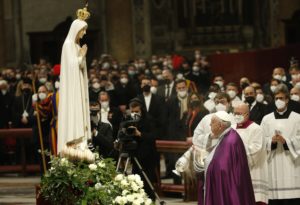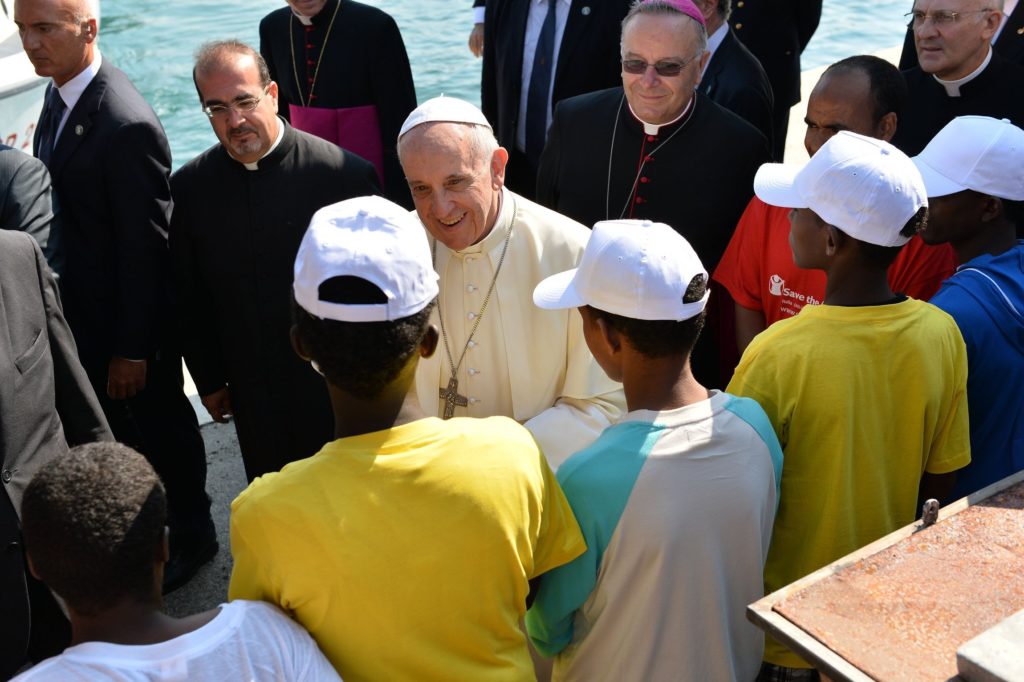ROME — From the moment of his election in October 1978, Pope John Paul II made clear what the opening act of his papacy would be about. On just his second foreign trip seven months later, he returned to his native Poland and thundered “Do not be afraid!,” effectively launching a cultural and spiritual challenge to the entire Soviet system.
Ten years later, as John Paul marked his first decade in office, that battle was all but over. “Perestroika” (“restructuring”) and “glasnost” (“openness”) were at their peak, and within a year the Berlin Wall would fall and the Soviet empire would follow shortly.
Mikhail Gorbachev himself once said, “The collapse of the Iron Curtain would have been impossible without John Paul II.”
Flash forward to March 2013 and the election of another maverick outsider to the throne of Peter. Just as a Polish pope was a natural to challenge Communism, history’s first pontiff from Latin America arguably was predestined to take on neoliberal, neocolonial capitalism, the toxic consequences of which he believes his native continent knows all too well.
Like John Paul before, Francis made it clear from the beginning what his own crusade would be. The new pope devoted his very first trip to the Mediterranean island of Lampedusa, a major point of arrival for desperate migrants and refugees from Africa and the Middle East seeking a better life.
While there, Francis attacked the “globalization of indifference,” employing for the first time what would become a signature rhetorical trope, and he also laid a wreath in the sea to commemorate the thousands of often forgotten people who’ve died attempting to make it across the Mediterranean, fleeing poverty, war, and other forms of injustice.
In effect, the Lampedusa trip was Francis’ entire social and political agenda in miniature.
While John Paul had taken aim at a formal political structure, Francis’ target was far more amorphous, as much a mindset and a cluster of values as a system. Given that, it’s probably no surprise that as Francis approaches his own 10-year mark, it’s not at all clear he’s on the brink of a John Paul-style historical victory over his chosen foe.
On the contrary, with a war raging in Ukraine, a stunning global total of 117 million forcible displaced or stateless persons in 2023, the largest global food crisis in history underway, and more than 700 million people living in extreme poverty, one could argue that Francis’ vision is every bit as far from realization as it was when he started.
Yet the comparison between John Paul and Francis at the one-decade mark may still be apt, if not in results so much as in ambition.
After the Berlin Wall came down and Soviet-style Communism disintegrated, John Paul took on new priorities — doing battle against what he famously described as a “culture of death” in the developed world, for instance, and pressing for reunion between Eastern and Western Christianity, so that the Church might once again “breathe with both lungs.”
In those two cases, John Paul didn’t really have any better luck than Francis. When his papacy ended in 2005, the developed world was further down the path toward acceptance of not only contraception and abortion but also euthanasia, while the structural divisions within Christianity remained very much intact.

It’s a reminder that judging popes by wins and losses may not be the best yardstick, and not simply because, as St. Mother Teresa put it, the Gospel standard isn’t success but fidelity. In truth, the more audacious a pope is in his reach, the more daring and dramatic his leadership, the lower his batting average is likely to be.
No, Pope Francis hasn’t ended poverty or war, nor has he solved the refugee crisis or ended climate change. Neither, of course, has anyone else. Yet his leadership on those fronts nevertheless has demonstrated anew the relevance of the papacy, and arguably provided a spiritual alternative to what might otherwise be an even greater degree of resignation and despair.
To put the point differently, suppose John Paul had not succeeded in galvanizing the Solidarity movement in Poland, and that the Soviet empire had never fallen. Would dissenters and victims of Communism thus style his papacy a failure — or, as seems more likely, would they nevertheless tout John Paul as a hero, having laid out a bold and courageous vision awaiting its historical denouement?
That, perhaps, is the real common thread uniting John Paul and Francis at the 10-year mark.
Both are what Americans might call “Daniel Burnham popes,” the reference being to the powerful turn-of-the-century architect and urban planner who famously said the following:
“Make no little plans. They have no magic to stir men’s blood, and probably will not themselves be realized. Make big plans, aim high in hope and work, remembering that a noble, logical diagram once recorded will never die, but long after we are gone will be a living thing, asserting itself with ever growing insistency. Remember that our sons and grandsons are going to do things that would stagger us.”
That’s the common term between two papacies which otherwise may seem highly dissimilar in ideological orientation, priorities, and personnel. Neither John Paul nor Francis were inclined toward little plans — and while Francis hasn’t yet won his fight, as John Paul had by this point, neither has he shown any inclination to throw in the towel.

